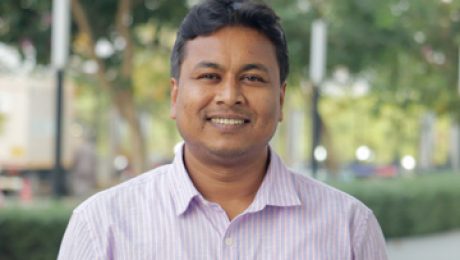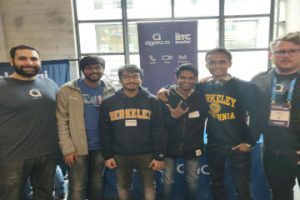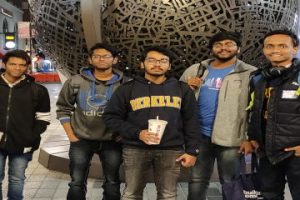SRM varsity to innovate in active learning forums, research
Amaravati: The Board of Governors of the SRM University held its two-day meeting which concluded on the campus of the Varsity on Friday.
Dr P Satyanarayanan, president of the SRM AP who presided over the meeting told newsmen that the Varsity is going to embark on massive expansion plan with greater resources and programmes for the faculty research and with an aim to enhance the student learning experience. He said that there would be new international collaborations to integrate innovation and technology-driven pedagogy such as active learning forums into the curriculum.
- Published in Newsroom
Dr. Pradyut Kumar Sanki
- Published in Assistant Professor, ECE Faculty, Faculty, SEAS
Tech Fest/Hackathon
On Feb 28th, 2019 at the 2nd edition of the SRM AP Tech Fest Dr. S. Chandrasekhar, Director, CSIR-Indian Institute of Chemical Technology will preside as the Chief Guest. Dr. Chandrasekhar, is a J.C. Bose National Fellow. The inauguration program is from 10.30 a.m. to 12 noon, followed by an Interaction Sessions with Dr. Chandrasekhar.
- Published in Events
SRM University AP welcomes Dr Kerry Healey, President of Babson College, on its Board of Governors
Hyderabad: SRM University AP welcomes Dr. Kerry Healey, President of Babson College, on its Board of Governors. Dr. Healey is a widely respected academic leader and under her stewardship, Babson has strengthened its reputation and position as the recognized global leader in entrepreneurship education, consistently ranked as the top school in its category.
The Board of Governors at SRM AP is responsible for providing strategic direction to the management and on ensuring that the University stays on course of its mission and vision of being a global university.
- Published in Newsroom
Integrate Liberal arts and technique
Liberal arts model in Indian higher education system will offer flexibility and innovation, say educationists Jamshed Bharucha and Anthony P Monaco
There seems to be a huge gap between academia and demands of the labour market since traditional pedagogy is no more favourable, says Jamshed Bharucha, VC and CEO, SRM University Amaravati AP.
- Published in Newsroom
Pitchathon 2k19
24-hour event with loads of “getting to know” exercises and a fun competition to top it all.
We start with a founder’s speed dating event and end with a B-Plan pitching competition!
There’ll be food, goodies and loads of fun!
Winners get cash prizes and an experience worth cherishing.
- Published in Events
SRM AP to host Amaravati’s First Ever student run National Hackathon on Feb 28
Amaravati, Feb 14 (UNI) SRM University, AP, Amaravati will host its first student run National Hackathon “HackSRM” on February 28 at the campus during its Tech Fest 2019.
It will bring together student coders from across the country to collaborate and create solutions to potential word problems through technology. HackSRM is expecting to have a large number of participants for the intense day-long-event.
SRM University, AP, Vice-Chancellor Dr.Jamshed Bharucha said that the registrations are currently on and interested participants can register on hacksrm.tech. More information of Tech fest 2019 and the AI workshop is at http:/srmap.edu.in/tech-festhackathon/
- Published in Newsroom
SRM AP TEAM WIN TOP PRIZE AT DEVELOPER WEEK HACKATHON, SAN FRANCISCO
|
|
Koushik Bhargav Muthe, CSE and his team from Next Tech Lab – Saptarshi Mazumder, CSE, Rajarshi Mazumder, CSE, Agniswar Paul, ECE, Souradeep Das, SRM KTR, CSE, participated in the Developer Week Hackathon (one of the world’s largest challenge driven hackathons) and won the top prize with an award of $1,000 from Agoraio. The team developed a Blockchain based game that incentivises people to buy products and was selected as the best hack by the Agoraio panel. “We built an Ethereum based card trading game for shoppers that helps sellers win over more customers. We did this by incorporating the Agoraio’s chatting platform into our game.” says Koushik Bhargav.
AND ANOTHER ONE! THE BEST BLOCKCHAIN UTILITY HACK
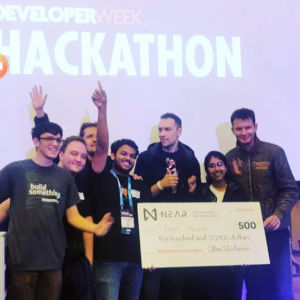
Miran, Niladri, and Sejal of Next Tech Lab from KTR – A Facebook developer and an entrepreneur, were among the top 5 teams at the Hackathon with 150+ teams and took the first prize for the “Best Blockchain Utility Hack” with a bounty of $500 from Near Protocol. The product will be shown in all developer week magazines. The team made a blockchain based contract system for making corporate or social contracts whereby both parties receive an email to accept or reject. Once both parties accept, an entry on the blockchain is made and the contract can be recovered anytime.
EARLIER IN DENVER
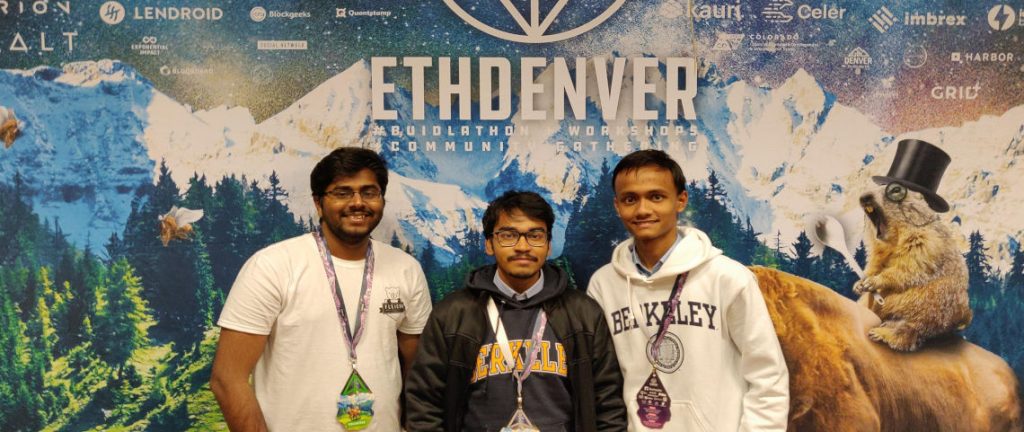
Koushik Bhargav CSE SRM AP and head of Satoshi lab at Next Tech lab, Sauradeep Das, CSE SRM KTR and Agniswar Paul, CSE SRM AP (all three presently in UC Berkeley for the 2019 semester abroad program) taking in the technological wonders at ETH Denver, Colorado, the world’s biggest Ethereum hackathon and conference, Feb.14-17. “It was one the best conferences I have attended, got to meet amazing people working on Blockchain technology from all over the world,” says Koushik. It was great because Satoshi lab focuses completely on Blockchain technology.” Koushik and his colleagues including Miran Junaidi shared ideas with developers, Blockchain startups, mentors and developing hacks. “Many more amazing events lined up for our semester in University of California, Berkeley.”
- Published in News
SRM AP’s intra-faculty Data Science course now in collaboration with UC Berkeley
This year SRM AP introduces Data Science for all students in the School of Liberal Arts and Basic Sciences (SLABS). Supported by intellectual capital of colleagues at the University of California- Berkeley, SRM AP’s Data Science course comprises lectures and labs that encourage discussion as students get comfortable in simple programming using Python.
“Recognizing that data science is an essential building block for critical applications of today and the future we are offering it as a foundation course for all SLABS students”, says SLABS Associate Dean, Dr. Shailender Swaminathan.
- Published in News
‘IPS based attendance system’ wins top prize at Ennovab’s business plan competition
Pitchathon 2k19 – a 24-hour entrepreneurial journey with a big result!
Ennovab, SRM AP’s entrepreneurial innovation lab launched the first 24-hour business plan competition that went from founders speed dating (complete strangers in insightful conversations) to rigorous brainstorming, to five groups of fifty students with common problems running market research, prototyping, punching out financial models – to the final pitch.
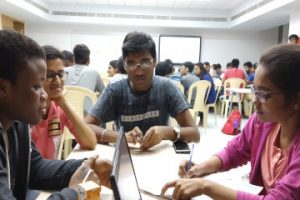 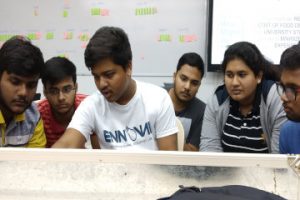 |
An IPS based Attendance System (an idea proposed by five first year students Prannoy Tuggiti, Manoj Manike, Moin Syed, Prabhu Avula, and Anvesh Reddyh) was awarded the first prize by a distinguished panel of judges (T. Ragunathan, Head of Computer Science and Engineering with 25 years in database systems; Dr. Srabani Basu, professor at Career Development Centre and former senior corporate trainer at Addeco India; and Dr. Marc Howard Rich, professor of English and Journalism, and former lecturer at Christopher Newport University)
The IPS based attendance system is a mobile application that enables students to mark attendance – one student per app. Of course, it works only if their location (determined by IPS, the Indoor Positioning System) is detected to be inside the stipulated class!
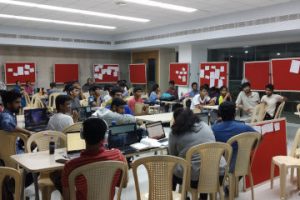 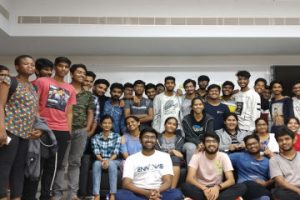 |
The first runner up team (Jaideep Cherukuri, Yash tripathi, Bhavana Yedlapalli, Krishna, Abhishree Sai) proposed a real-time ETA system for autos so SRMites located in the middle of nowhere can make quick getaways!
While the 2nd runner up team of Rahul Gupta, Ruthwik Reddy, Dileep Patted, Arumilli Nikitha and Poorna Sai proposed a Smart ID card that can be used instead of paper coupons in places like the canteen and library.
To join future events follow @ennovab on Instagram.
- Published in News


